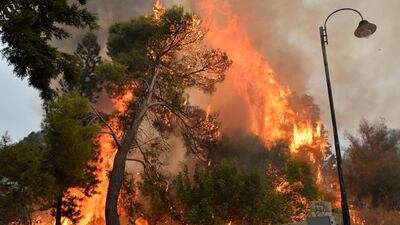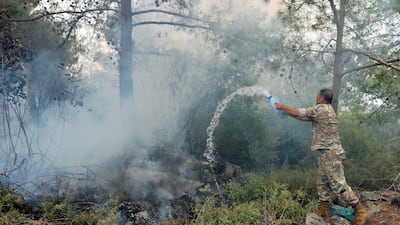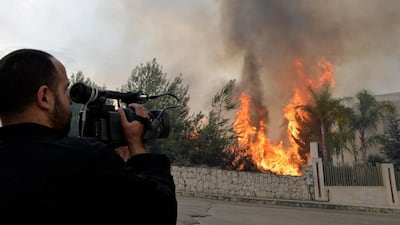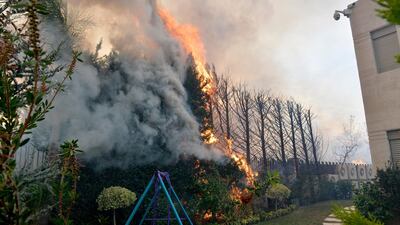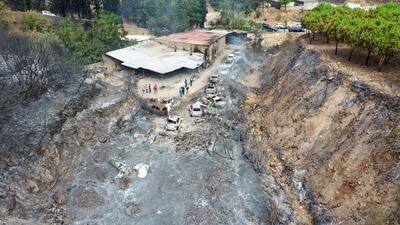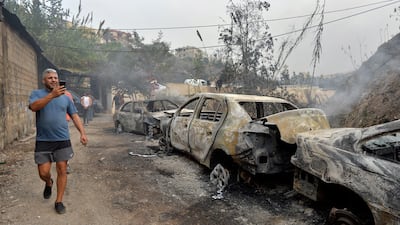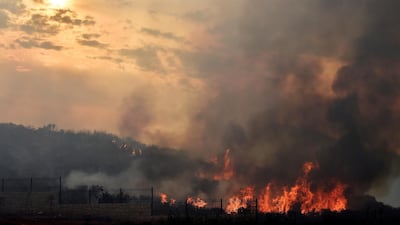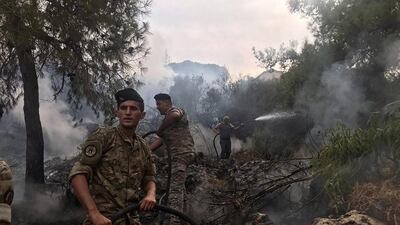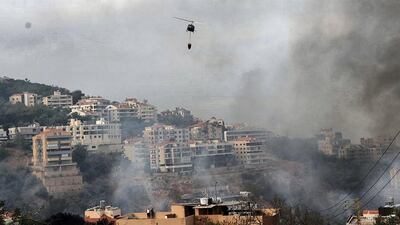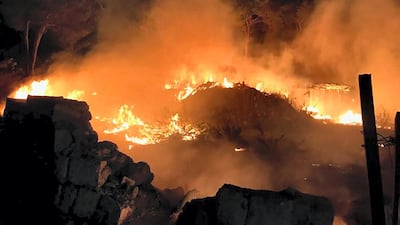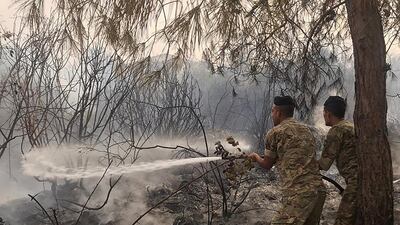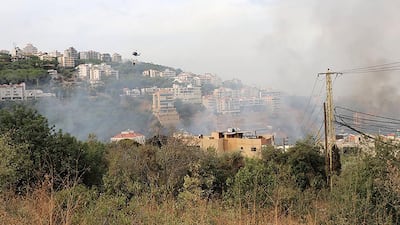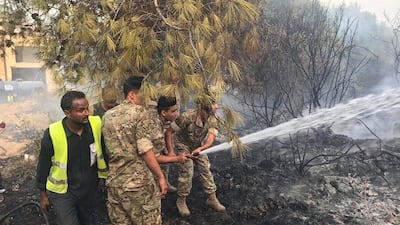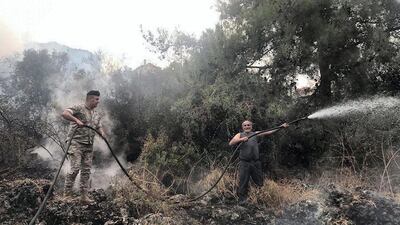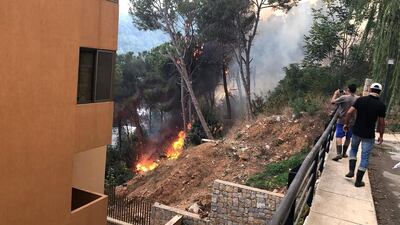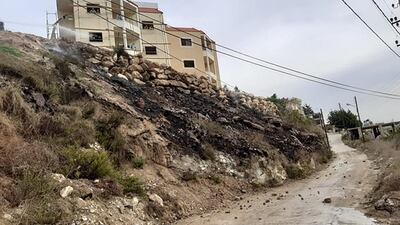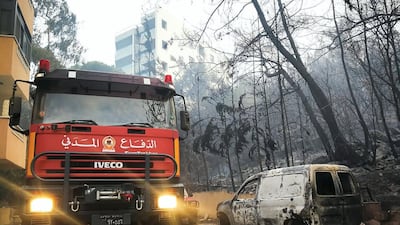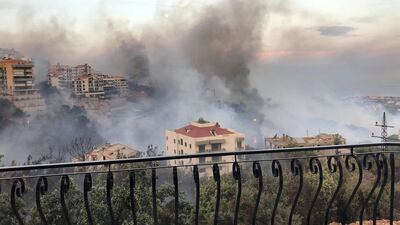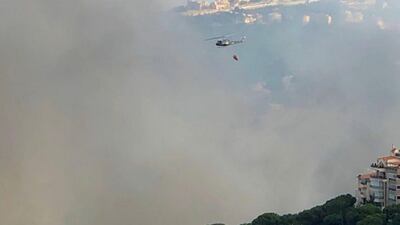Lebanon asked for international help after it struggled to contain forest fires that have spread across the country since Monday.
The death of a volunteer assisting firefighters has raised questions about the state’s lack of preparedness despite regularly experiencing fires at this time of year.
High winds and a rise in temperatures exacerbated forest fires that were particularly devastating in the Chouf region, a mountain area south-east of Beirut. which is famous for its cedars and reserves.
Videos on social media showed flames threatening villages under an orange sky and the charred remains of pine forests.
Lebanese media reported that a young man, Salim Abou Mujahed, died of a heart attack while trying to help civil defence units extinguish the fires.
Four houses burnt to the ground in the Meshref area while flames reached the balconies of surrounding houses after residents fled, Lebanon’s state-run National News Agency reported
Several shops along a motorway outside Beirut were destroyed.
A garage owner lost 11 cars in the blaze and police brought in water cannon used for crowd control to assist.
Large areas of land and olive trees were burnt in the Akkar region in northern Lebanon, with flames close to mobile-phone towers.
Yesterday there were 103 fires burning over Lebanon, said the director of civil defence, Brig Gen Raymond Khattar. Five volunteer firefighters were injured.
Temperatures soared in Lebanon over the past few days, often exceeding 30°C, which is “three or four degrees higher than they have been over the past 150 years”, said Nadim Farajalla, of the American University of Beirut.
The intensity of the fires and the country’s lack of ability to fight them shocked Lebanon.
President Michel Aoun, Prime Minister Saad Hariri and Justice Minister Albert Serhan called for an investigation into the cause of the blazes.
Mr Hariri said that if the fires were started intentionally, those responsible “will pay a price”.
Natural forest fires are normal in Lebanon but many are either the result of arson or caused by negligent farmers clearing their land, said George Mitri, director of land and natural resources at the University of Balamand.
In 2009, three Sikorsky S-70 firefighting helicopters were donated to the government but fell into disrepair, causing outrage.
“It’s very unfortunate that these three helicopters have not participated in the firefighting,” said Ziad Baroud, who was interior minister at the time they were bought.
The Lebanese government did not “pay a penny” for the helicopters, which can carry 4,000 litres of water each, Mr Baroud said.
Businesspeople, the Association of Lebanese Banks and even university students provided $13.9 million (Dh51m) for their purchase.
But the state had to pay $450,000 a year for their upkeep, “which is nothing compared with the costs caused by a fire and losses in green areas and properties”, Mr Baroud said.
The total cost of damage caused by the latest fires has yet to be established.
It remains unclear when the helicopters were grounded, although Mr Baroud said they were “used in no less than 11 firefighting operations between 2009 and 2012”.
A spokeswoman for Interior Minister Raya El Hassan told Lebanese newspaper The Daily Star that "there is no money in the Treasury – there is no money to do maintenance".
The country is facing a financial crisis.
Yesterday, Mr Aoun called for an investigation to determine who was responsible for the Sikorsky aircraft “not working in years, as well as the quick inspection of the three aircraft and speeding up the provision of spare parts”.
The Lebanese army stepped in with four helicopters to help civil defence units.
But they struggled to contain the fires because of “heavy smoke and high-tension transmission lines that sometimes blocked rapid and effective intervention”, the army said yesterday.
Its helicopters can carry 700 litres of water, which is not enough to extinguish major blazes, Mr Mitri said.
Cyprus and Greece responded to Mrs El Hassan’s call for help from neighbouring countries, sending helicopters, fixed-wing aircraft and firefighting equipment.
The Progressive Socialist Party, which has strong support in the Chouf region, also announced that Jordan would send a helicopter.
Environment Minister Fadi Jreissati tried to calm tension yesterday as he inspected damage caused by fires in the region.
“Today is not the time for denunciation but to secure money to buy equipment for the civil defence," Mr Jreissati said.
He announced that representatives from the army and his ministry would travel to Spain to buy two firefighting helicopters.
“Sikorsky aircraft are not technically appropriate to intervene,” Mr Jreissati said.
The last time Lebanon suffered such ferocious forest fires was in 2007, when the situation was so bad it pushed the government to develop a national strategy for fire management, Mr Mitri said.
It was never carried out.
“They do not consider it as a priority and that’s a problem," Mr Mitri said. "Fires are increasing for different reasons, such as lack of maintenance or people abandoning their agricultural lands."
Lebanon’s civil defence teams have only 200 fire engines, which are not enough to tackle the latest fires.
The situation was expected to be brought under control by today as weather improves, but what Lebanon really needed was better prevention, Mr Mitri said.
“I hope that the government will look into what happened these past two days very seriously and start thinking of how to prevent fires next season and not wait until then," he said.
“Lebanon lacks a management plan. There are no inventories of our forests and no harvesting plans. Conditions are very bad."
